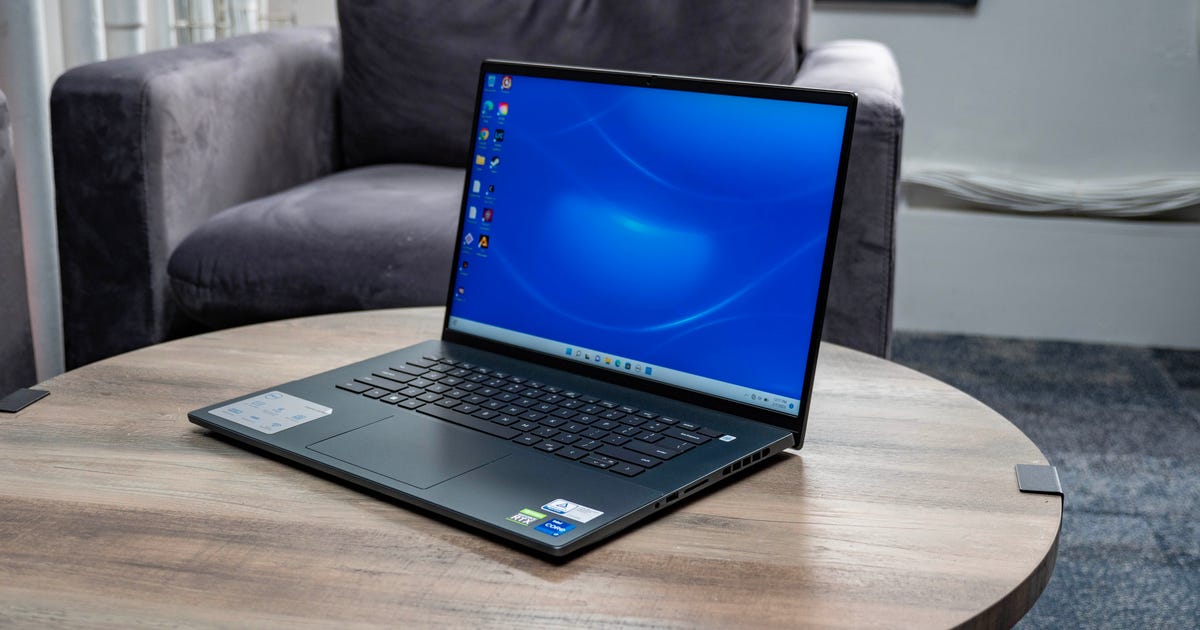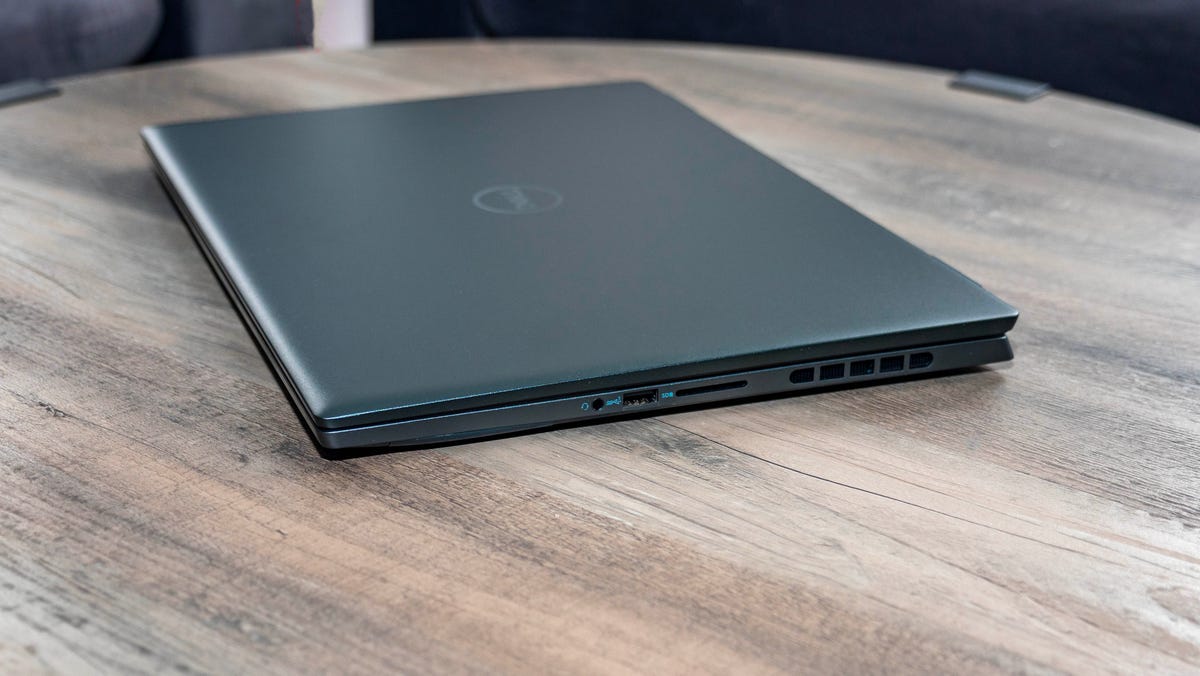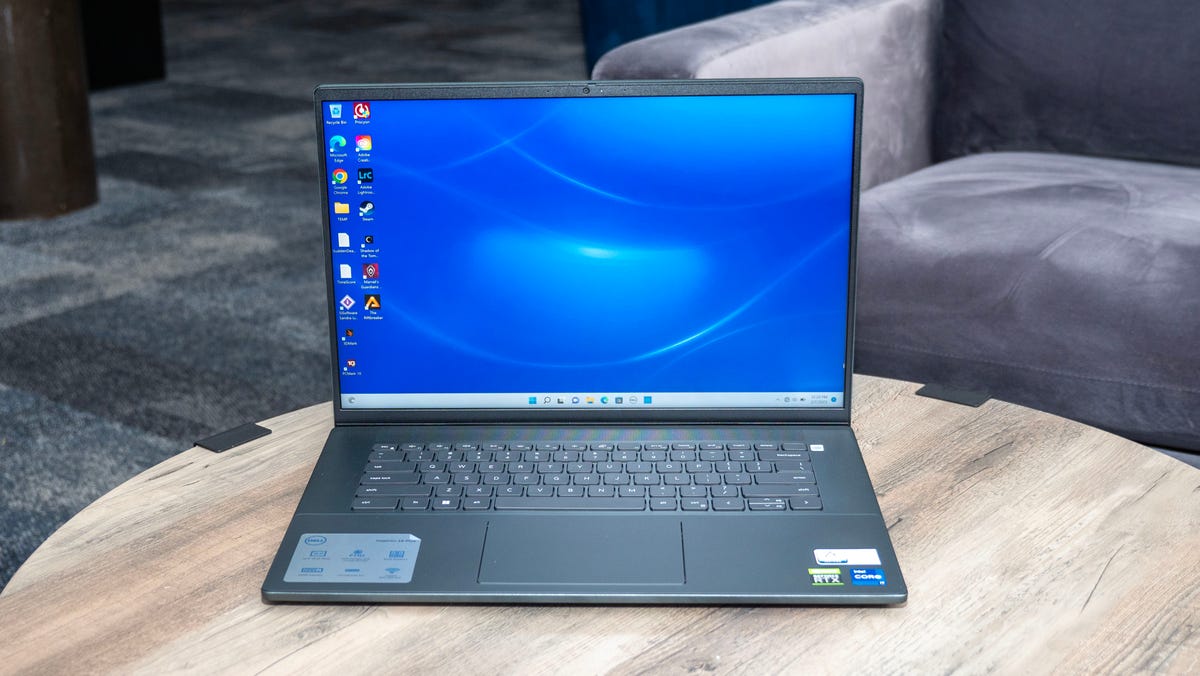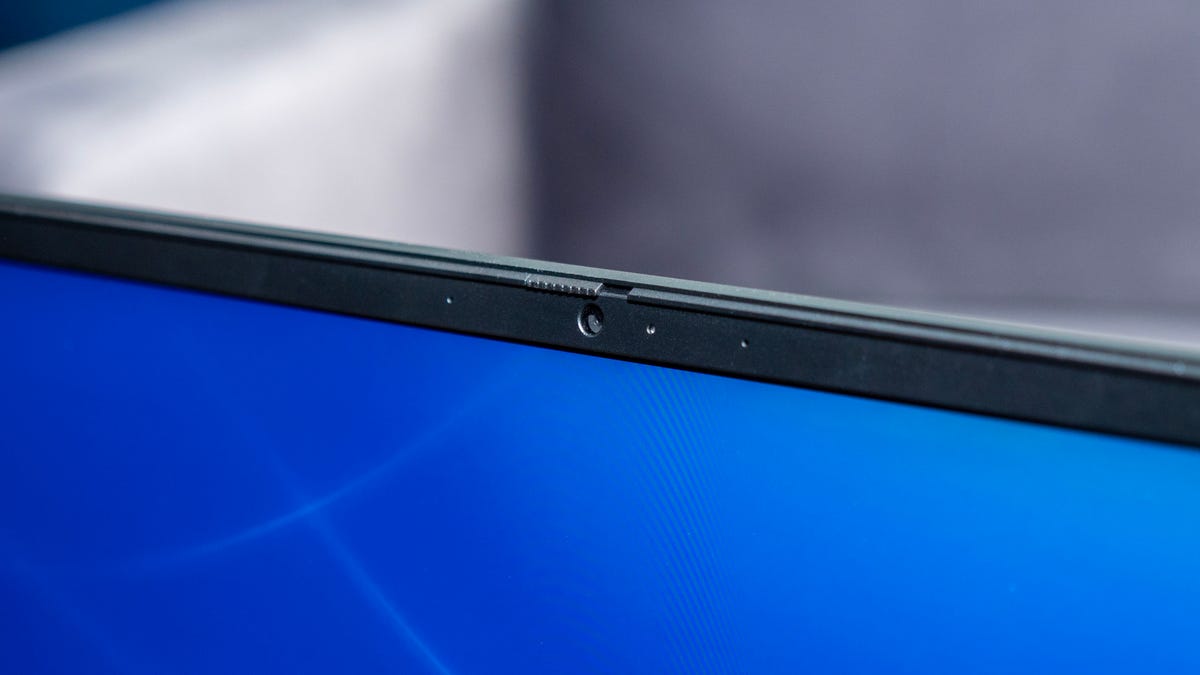
When we looked at the first iteration of Dell’s Inspiron 16 Plus about 18 months ago, it was among the first 16-inch, 16:10 Windows laptops we’d seen, and we gave it an Editors’ Choice award for its roomy display, clean design, strong performance and long battery life. The latest version of the Inspiron 16 Plus offers improved performance and longer battery life while making a few tweaks to the laptop’s design without addressing our biggest gripes about the flex that can be felt in its keyboard deck and the lack of display upgrade options.
Making these omissions more glaring is the fact that the starting price of the Inspiron 16 Plus has gone up. It previously started at less than $1,000 and now starts at $1,600 for a system with a 16-inch, 300-nit display with a 3K resolution powered by an Intel Core i7-12700H processor and RTX 3050 Ti graphics. At this price, the Inspiron 16 Plus straddles the line between a midrange and premium laptop, where it’s not unreasonable to expect a stronger aluminum chassis and an optional OLED panel to be part of the package.
Like
- Elegant design in subtle green hue
- Strong application and graphics performance
- Long battery life
Don’t Like
- Can’t upgrade the display
- Flex in keyboard deck
We reviewed the baseline $1,600 model that features the Core i7-12700H CPU, RTX 3050 Ti graphics, 16GB of RAM and a 512GB solid-state drive. The step-up model costs $1,950 and upgrades you to RTX 3060 graphics while doubling the RAM to 32GB and SSD to 1TB. Both models feature the same 16-inch, non-touch display with a 16:10 aspect ratio, 3K (3,072×1,920 pixel) resolution and 60Hz refresh rate. The Inspiron 16 Plus starts at £1,369 in the UK and AU$1,887.60 in Australia.
The Inspiron 16 Plus offers a sleek, understated look. A large, 16-inch, 16:10 laptop is never going to be the best travel companionion but Dell manages to make the Inspiron 16 Plus fairly compact. It’s only 0.75-inch at its thickest point and tapers to 0.67-inch at its front edge. At 4.6 pounds, its weight is average for its class. By comparison, the 16-inch MacBook Pro weighs 4.7 pounds. Then again, the 16-inch Acer Swift Edge weighs just 2.6 pounds, making it a better fit if you are looking for a large-screen laptop for on the go.

The Inspiron 16 Plus has a good port assortment including a full-size SD card slot.
Josh Goldman/CNET
The Inspiron 16 Plus features an all-aluminum enclosure with a slight green tint to it. The hint of dark green differentiates the laptop from the ocean of silver, brushed aluminum laptops, but you had better like the dark green look because it’s the only color option on offer. Overall, it’s a pretty subdued look and shouldn’t look out of place in an office.
Dell Inspiron 16 Plus 7620
| Price as reviewed | $1,600 |
|---|---|
| Display size/resolution | 16-inch 3,072×1,920 60Hz display |
| CPU | 2.3GHz Intel Core i7-12700H |
| Memory | 16GB DDR5 PC5-38400U DDR5-4800 |
| Graphics | Nvidia GeForce RTX 3050 Ti Laptop GPU |
| Ports | HDMI 2.0, Thunderbolt 4.0 USB-C, USB 3.2 Gen 1 Type-A (x2), SD card reader, combo audio jack |
| Storage | NVMe BC711 NVMe SK hynix 512GB (512.1GB, NVMe) |
| Networking | Wi-Fi 6E (6GHz) AX211 2×2 Bluetooth 5.2 |
| Operating system | Windows 11 Home 21H2 |
No numpad, funky touchpad
One of the biggest changes Dell made to this year’s model is jettisoning the number pad of the previous version. Personally, I don’t miss having a numpad and like having the keyboard centered below the display. What I don’t like is the flex underneath the keys as I typed. As we found in the previous model, there’s too much flex in the keyboard deck. The flat keys offer shallow travel that touch typists will appreciate, but the keys feel a bit mushy, a feeling that’s only exasperated by the flex of the keyboard deck.

The touchpad is… different.
Josh Goldman/CNET
The touchpad also received an update. It now has borders on only three sides, with the top edge blending seamlessly into the rest of the keyboard deck. The touchpad has a matte finish for smooth gliding, and it accurately recorded my swipes and other mouse gestures. The click response felt a tad firm and required a bit too much effort to engage, especially toward the top.
The display remains the same as last year’s model. It’s a 16-inch, 16:10 panel with a 3K (3,072×1,920) resolution. Images and text look razor sharp, but two items may give would-be buyers pause: its brightness rating of 300 nits and a refresh rate of 60Hz.

Josh Goldman/CNET
Budget models offer 250-nit panels, so the Inspiron 16 Plus’s 300-nit panel is only a step up from entry level. I found myself with the display brightness maxed out during my time with the system, even indoors on gray, winter days under soft, artificial light. A 350- or 400-nit panel isn’t an unreasonable expectation on a $1,600 laptop, especially one with RTX graphics that may draw the interest of content creators. Better yet, graphics professionals and hobbyists can get an OLED panel at this price, as the Acer Swift Edge proves.
Gamers looking for a do-it-all laptop with some gaming capacity will be disappointed by the 60Hz refresh rate. It’s too bad that Dell didn’t pair the RTX 3050 Ti graphics with a 120Hz or 144Hz panel or at least give you the option to upgrade to a faster display.
Now onto some better news: The Inspiron 16 Plus quad speakers produce above-average laptop audio, and the 1080p webcam produces crisp, well-balanced images. The webcam also has a privacy shutter, which is something we always like to see. The webcam isn’t an IR cam, so you can’t use it to log into Windows via facial recognition. The power button doubles as a fingerprint reader, however, so you still have a biometric option for secure logins.

The webcam has a physical privacy shutter.
Josh Goldman/CNET
Let’s close with some comments on the Inspiron 16 Plus’s ports and performance. You might balk at having only one USB-C Thunderbolt 4 port, but that should suffice since you charge the laptop via a barrel connector, which keeps the Thunderbolt 4 port free, even when the laptop is plugged in. Also, the SD card slot is an inclusion that content creators and media editors in particular will appreciate.
The Inspiron 16 Plus’s application and graphics performance can’t match that of the 16-inch Macbook Pro, but it stands tall among its Windows competition. Its 12th-gen Core i7 CPU and RTX 3050 Ti GPU offer ample performance for content creators and even some muscle for gamers, but the Inspiron 16 Plus fails to deliver a display suitable for either type of user.
As currently constituted, the Inspiron 16 Plus is a better fit for mainstream users looking for a large-screen laptop that delivers an extra jolt of performance from a powerful Core i7 CPU and low-end RTX graphics. And while the RTX 3050 Ti is toward the bottom of the RTX pecking order, it delivers far greater graphics performance than would an integrated graphics processor. Hopefully, Dell upgrades the display on the next edition as either the standard offering or an optional upgrade while also firming up the keyboard deck.
The review process for laptops, desktops, tablets and other computer-like devices consists of two parts: performance testing under controlled conditions in the CNET Labs and extensive hands-on use by our expert reviewers. This includes evaluating a device’s aesthetics, ergonomics and features. A final review verdict is a combination of both objective and subjective judgments.
The list of benchmarking software we use changes over time as the devices we test evolve. The most important core tests we’re currently running on every compatible computer include: Primate Labs Geekbench 5, Cinebench R23, PCMark 10 and 3DMark Fire Strike Ultra.
A more detailed description of each benchmark and how we use it can be found in our How We Test Computers page.
Geekbench 5 (multicore)
MacBook Pro (16-inch, 2023)
Dell Inspiron 16 Plus 7620
Dell Inspiron 16 Plus (7610)
Acer Swift SFA16-41 Swift Edge
Samsung 950XEE Galaxy Book2 Pro
Note:
Longer bars indicate better performance
Cinebench R23 (multicore)
Dell Inspiron 16 Plus 7620
MacBook Pro (16-inch, 2023)
Dell Inspiron 16 Plus (7610)
Acer Swift SFA16-41 Swift Edge
Samsung 950XEE Galaxy Book2 Pro
Note:
Longer bars indicate better performance
3DMark Wild Life Extreme
MacBook Pro (16-inch, 2023)
Dell Inspiron 16 Plus 7620
Dell Inspiron 16 Plus (7610)
Samsung 950XEE Galaxy Book2 Pro
Acer Swift SFA16-41 Swift Edge
Note:
Longer bars indicate better performance
PCMark 10 Pro
Dell Inspiron 16 Plus 7620
Dell Inspiron 16 Plus (7610)
Acer Swift SFA16-41 Swift Edge
Note:
Longer bars indicate better performance
UL Procyon Video test using Adobe Premier
Dell Inspiron 16 Plus 7620
Dell Inspiron 16 Plus (7610)
Samsung 950XEE Galaxy Book2 Pro
Acer Swift SFA16-41 Swift Edge
Note:
Longer bars indicate better performance
3DMark Storage Benchmark
Dell Inspiron 16 Plus 7620
Samsung 950XEE Galaxy Book2 Pro
Acer Swift SFA16-41 Swift Edge
Note:
Longer bars indicate better performance
Online streaming battery drain test
MacBook Pro (16-inch, 2023)
Dell Inspiron 16 Plus 7620
Dell Inspiron 16 Plus (7610)
Samsung 950XEE Galaxy Book2 Pro
Acer Swift SFA16-41 Swift Edge
Note:
Longer bars indicate better performance
